
Қазақстан Республикасының Білім және ғылым министрлігі
Мағжан Жұмабаев атындағы жоғары колледжі
« ДИДАКТИКАЛЫҚ ӘДІСТЕМЕ»
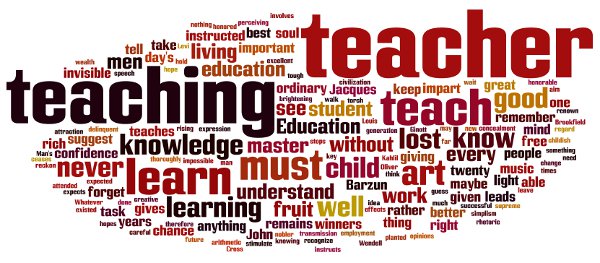
Құрастырған : УИЯ -1-17 тобының студенті
Кожахметова Зарина Канатовна
Петропавл қаласы, 2021
Content
Introduction ..........................................................................................................3
CHAPTER І. «The great teacher is the guardian of the human spirit and the олоолодоооhuman mind»
1.1. About Great Teachers........................................................ 4
1.2пAphorisms and quotes about teacher................................. 8
CHAPTER ІІ. « Without teachers, life would have no»
1.3.пролл Poems about teacher………………………………………………..... 11
1.4. Pedagogical situations……………………………………………….. 14
Conclusion………………………………………………………………………. 16
Resources……………………………………………………………………….. 17
INTRODUCTION.
The updated content of education is a completely new program, textbooks, standards and personnel. In a society dominated by education and information, the education system is a fundamental part of the innovative economy. The innovative economy, in which strict requirements are formed, requires the competence of today's specialist in any field, that is, the formation of thoughts in their field, professionalism, adaptability to changing life conditions, not only to use their knowledge in accordance with it, but also to supplement it as needed. How is it effective to educate future generations in such a society?
This question will certainly concern every teacher.The teacher has played and continues to play an important role in the child's full-fledged education.However, no teacher can limit himself to primary education and teach students.Therefore, teaching requires a lot of research, innovation, and hard work. In the context of modern education, it is necessary to pay special attention to the component of English Language teachers.
Knowledge of English now is a requirement of the time. Therefore, it is necessary to create conditions for English Language teachers to maximize their personal and professional competence. Thus, it is necessary to accumulate the experience of trilingualism within the framework of the multilingual education program and raise our country to the world level. This will allow students to expand their participation in international projects, strengthen scientific ties with foreign colleagues, and gain access to sources of information in foreign languages.
3
CHAPTER I. «The great teacher is the guardian of the human spirit and the human mind»
“ Knowledge of a foreign language and culture makes a person equal with this people.”
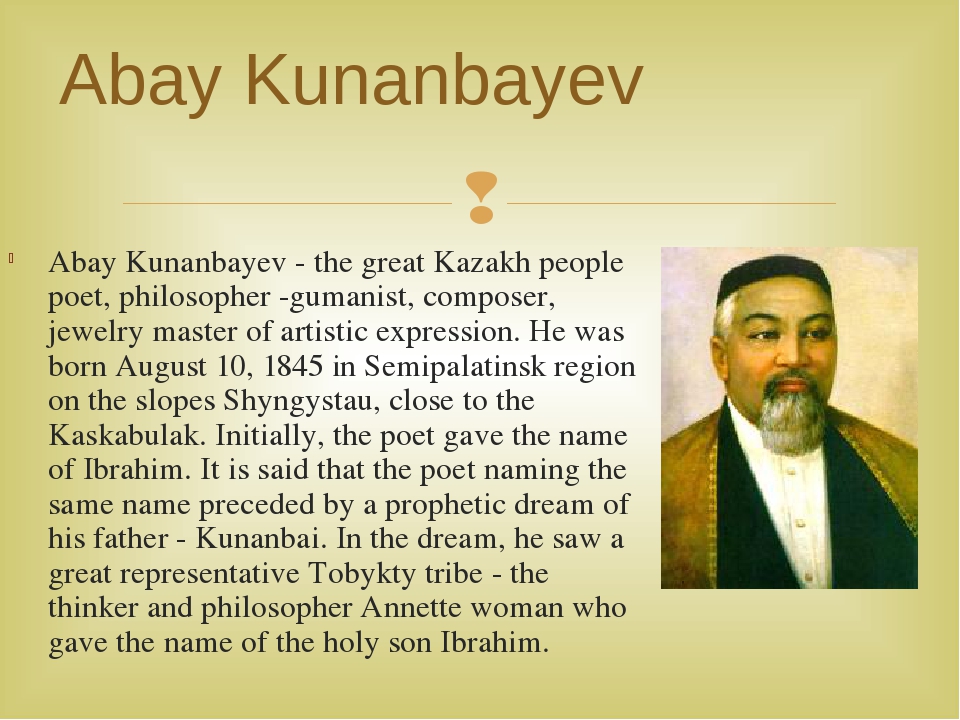
4
“Being a teacher is not a service, but a God-given vocation. You should have a high soul for this, able to give your flame to other people, without".
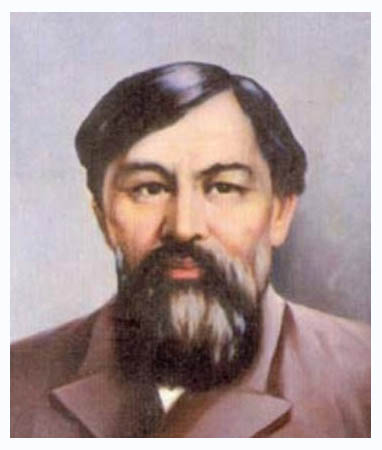
Ybyrai (Ibrahim) Altynsarin (1841 – 1889) was a major figure in pre-Soviet Kazakh history. He was the most prominent Kazakh educator of the late 19th century, during the period of Russian colonization of and cultural influence in Kazakhstan.
Altynsarin was born in the Araqaraghai region of Torghai oblast (now Kostanay Province), and in his early career was an inspector of Torghai schools. He is best known for introducing a Cyrillic alphabet for the Kazakh language, and was a proponent of teaching in the Western style. However, he opposed the teaching of Orthodox Christian doctrines to non-Russian Kazakhs, but at the same time urged resistance to Tatar language and culture, in favor of Russian and Western influences.
As an educator, he opened numerous Kazakh-Russian boarding schools, technical schools and schools for girls.
5
“Only he can become a real teacher, who never forgets that he himself was a child”.
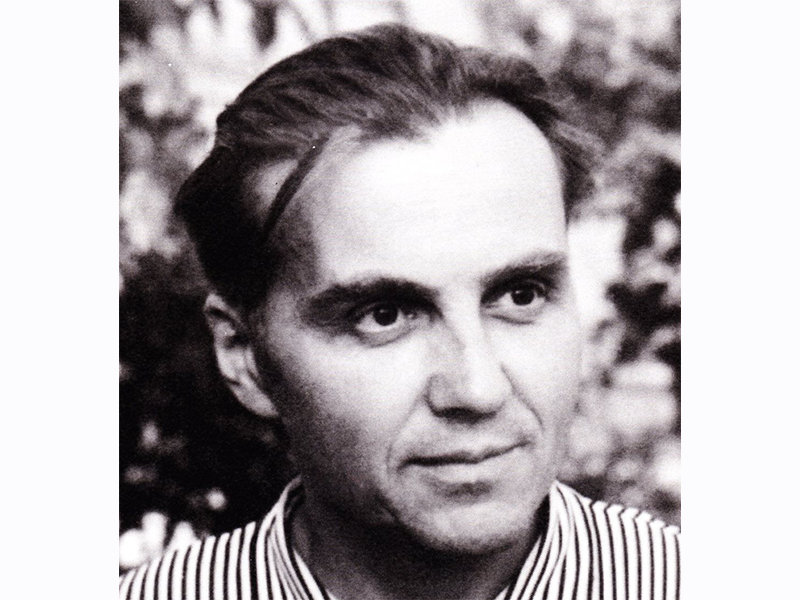
V.A. Sukhomlinsky was a humanistic educator who saw the aim of education as being to produce a truly humane being. For him this meant someone who was strong and healthy (physically and emotionally) and who was a personification of kindness. It meant someone who had a deep appreciation of beauty, who had developed their intellect (and was observant and aware of their environment), and who had developed their talents and used them for the benefit of society.
The core of Sukhomlinsky’s system of education was his approach to moral education, which involved sensitizing his students to beauty in nature, in art and in human relations, and encouraging students to take responsibility for the living environment which surrounded them. Sukhomlinsky taught his students that the most precious thing in life is a human being, and that there is no greater honour than to bring joy to other people. He taught them that to bring joy to other people, and especially to their families, they should strive to create beauty in themselves and in the environment.
There was thus a very close connection between moral and aesthetic education in Sukhomlinsky’s approach.
6
"True teachers cannot die, they only dissolve into thousands of young men and women, turning them into individuals, into people of high goals with”.
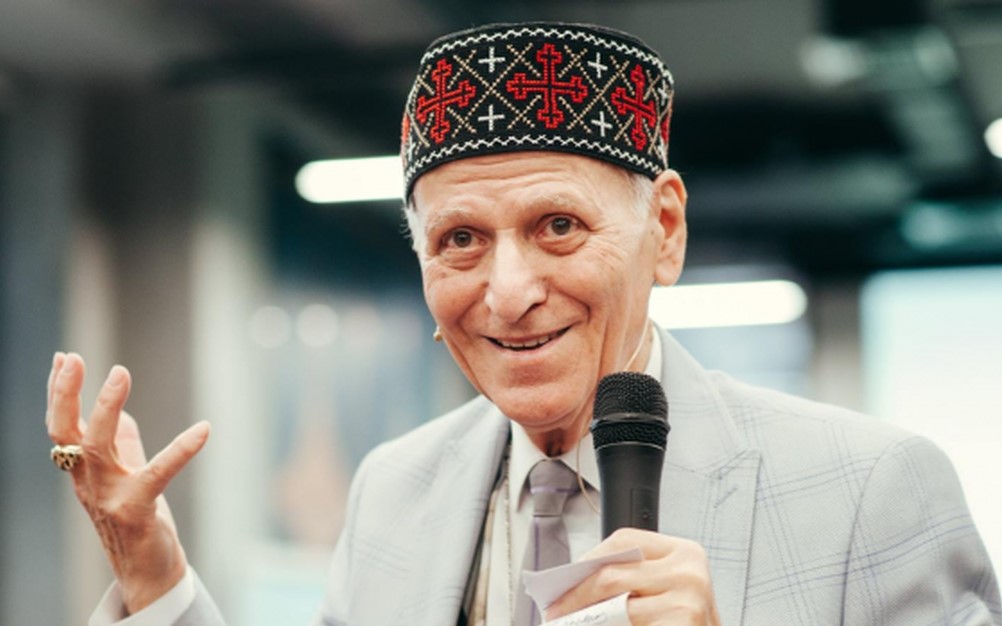
Amonashvili was born on March 8, 1931 in Tbilisi. Graduated from Tbilisi State University, Faculty of Oriental Studies. He began his teaching career as a pioneer leader in 1952, as a second-year student.
In 1958, he completed postgraduate studies at the Gogebashvili Research Institute of Pedagogy and defended his PhD thesis in pedagogy in 1960.
Amonashvili is one of the rare scientists who refuse his PhD thesis, because it is refuted by his subsequent ideas.
The Academician David Onisimovich Lordkipanidze calls his teachers “He made me addicted to classical pedagogy (Komensky, Ushinsky, Gogebashvili, Russo, Pestalozzi».
7
“A good teacher is one who learns all the time.”
-
« The dream begins with a teacher who believes in you, who tugs and pushes and leads you to the next plateau, sometimes poking you with a sharp stick called truth ». - Dan Rather
-
“If we teach today’s students as we taught yesterday’s, we rob them of tomorrow”. - John Dewey
-
“The mediocre teacher tells. The good teacher explains. The superior teacher demonstrates. The great teacher inspires”. -William A. Ward
-
“It is the supreme art of the teacher to awaken joy in creative expression and knowledge”. -Albert Einstein
-
“There are two kinds of teachers: the kind that fill you with so much quail shot that you can't move, and the kind that just gives you a little prod behind and you jump to the skies”. -Robert Frost
-
“Technology is just a tool. In terms of getting the kids working together and motivating them, the teacher is the most important”. -Bill Gates
-
“He who dares to teach must never cease to learn”. - John Cotton Dana
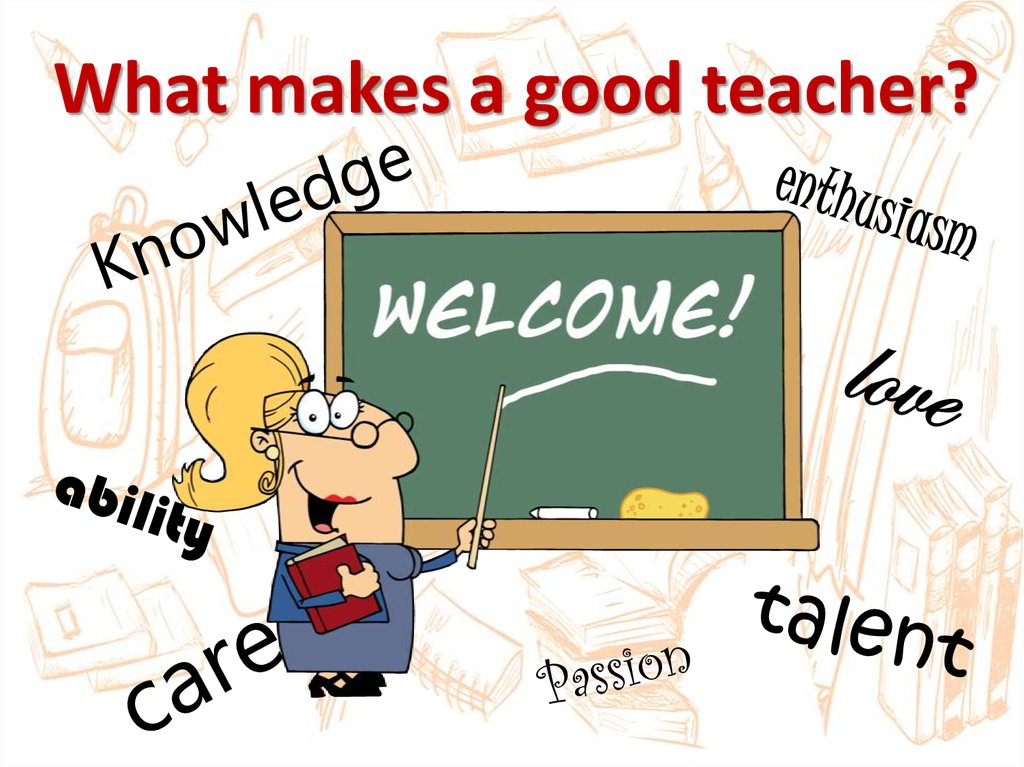
8
-
“There are three good reasons to be a teacher — June, July, and August”.
-
"Awaken people's curiosity. It is enough to open minds, do not overload them. Put there just a spark." -Anatole France
-
"A teacher affects eternity; he can never tell where his influence stops." - Henry Brooks Adams
-
"A teacher is one who makes himself progressively unnecessary." - Thomas Carruthers
-
" A teacher who is attempting to teach, without inspiring the pupil with a desire to learn, is hammering on a cold iron." - Horace Mann
-
"I hear—I forget, I see—I learn, I do—I understand." ~ Gennady V. Oster
-
"The important thing is not so much that every child should be taught, as that every child should be given the wish to learn." ~ John Lubbock
-
"What we hope ever to do with ease, we must learn first to do with diligence." ~ Samuel Johnson.
-
"In every case, the remedy is to take action. Get clear about exactly what it is that you need to learn and exactly what you need to do to learn it." ~ Miguel de Cervantes.
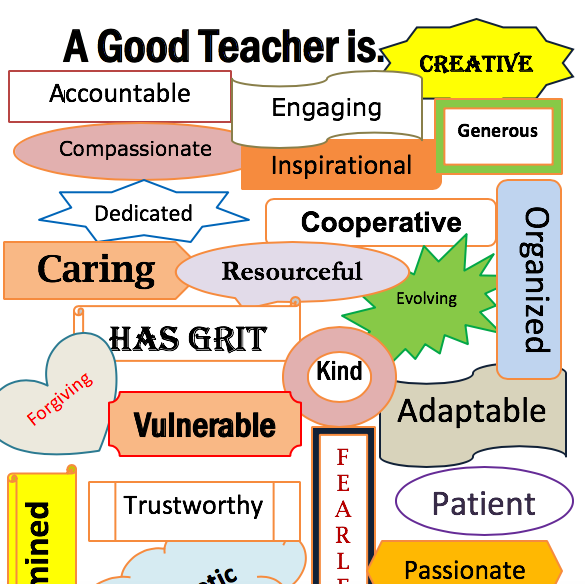
9

![]()
“ Like teacher, like pupil”
"Never regard study as a duty, but as the enviable opportunity to learn to know the liberating influence of beauty in the realm of the spirit for your own personal joy and to the profit of the community to which your later work belongs." ~ Albert Einstein.
 "Aim for success, not perfection. Never
give up your right to be wrong, because then you will lose the
ability to learn new things and move forward with your life." ~ Dr.
David M. Burns
"Aim for success, not perfection. Never
give up your right to be wrong, because then you will lose the
ability to learn new things and move forward with your life." ~ Dr.
David M. Burns
![]() "Get over the idea that only children should
spend their time in study. Be a student so long as you still have
something to learn, and this will mean all your life." ~ Henry
Doherty .
"Get over the idea that only children should
spend their time in study. Be a student so long as you still have
something to learn, and this will mean all your life." ~ Henry
Doherty .
![]() "You can do one of two things; just shut
up, which is something I don't find easy, or learn an awful lot
very fast which is what I tried to do." ~ Jane
Fonda.
"You can do one of two things; just shut
up, which is something I don't find easy, or learn an awful lot
very fast which is what I tried to do." ~ Jane
Fonda.

"One cannot guess how a word functions. One has to look at its use and learn from that. But the difficulty is to remove the prejudice which stands in the way of doing this. It is not a stupid prejudice." ~ Ludwig Wittgenstein .

"Live with intention. Walk to the edge. Continue to learn. Play with abandon. Choose with no regret. Laugh! Do what you love. Love as if this is all there is." ~ Mary Anne Radmacher-Hershey.
10
CHAPTER ІІ. « Without teachers, life would have no»

I’m happy you’re my teacher.
Thanks for all you do.
You make learning easy.
Your lessons are fun, too!

GOOD TEACHER

For teaching children lessons,
To help them as they grow,
Let this gift remind you,
You’re the best teacher we know!

I always love your class;
Your teaching helps me see,
That to have a happy life,
Learning is the key.
 11
11

I’m grateful for your wisdom
For the teacher that you are;
You’re a very good person,
And as a teacher, you’re a star!

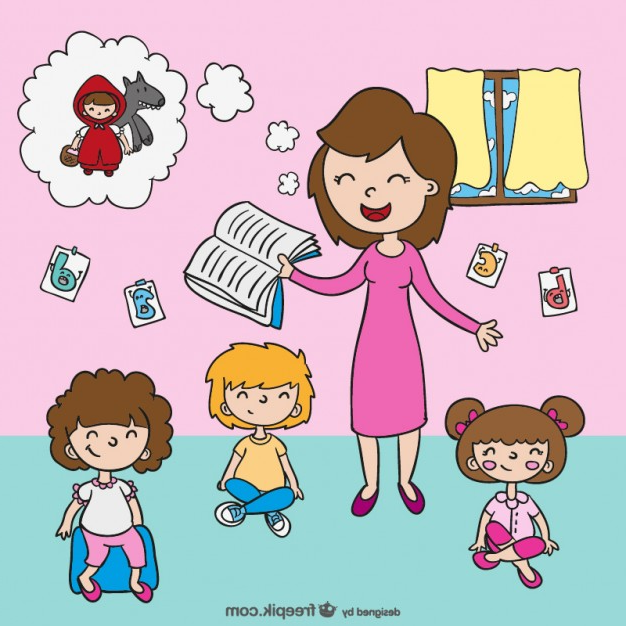

Thank you for your caring
And lots of other stuff;
For all the things you gave me,
I can’t thank you enough.
12

God understood our thirst for knowledge,
and our need to be led by someone wiser;
He needed a heart of compassion,
of encouragement, and patience;
Someone who would accept the challenge
regardless of the opposition;
Someone who could see potential
and believe in the best in others ...
So He made Teachers

With your kindness you get my attention;
Every day you are planting a seed
Of curiosity and motivation
To know and to grow and succeed.

A teacher is like Winter,
While it’s snowing hard outside,
Keeping students comfortable,
As a warm and helpful guide.


13
“Pedagogical situations”



14




DO THESE PEDAGOGICAL
SITUATIONS
15
Conclusion
New teaching of a foreign language has been gaining momentum in recent years. Of course, the responsibility of teachers in the design of the lesson will allow students to communicate effectively in a foreign language. They can achieve great success in a short time with the help of new technologies . Therefore, colleges make every effort to train future English teachers. The knowledge gained from theoretical knowledge and experience is combined to improve our professional competence, that is, future generations. The college pays great attention to the theoretical formation of personal and professional qualifications of future English teachers. The lesson on the methodology of a foreign language teaches what qualities a particular professional should have, how to work with students.
The changes in the political, cultural and other social spheres of society, integration of social institutions in the international education and professional space, have a significant influence on the preparation of specialists of various fields; contribute to closer interaction between representatives of different cultures. Education in our time is becoming more international, multilingual and multicultural. Many quantitative students learn foreign languages, reading books, newspapers, magazines, listening to music, talking to native speakers via the Internet, thus, joining to the culture of the English speaking country. This means that the mastery of a foreign language contributes to the understanding of other cultures.
The current methodological development can be used by students of the qualification of a teacher of a foreign language, teachers of a foreign language, as well as for the purpose of self- education.
This collection is for someone who wants to improve knowledge of English language, to develop speaking skills and for tourists who is going to travel to aboard, for young teachers as well.
16
Resources
1. Kuskovskaya S. English Proverbs and Sayings.1987. —p. 253
2. Практический Курс Английского языка 1 курс. Федуленкова Т.Н. 6- издание, (2007, 256с.)
3.Assorted English Activities (Сборник для преподавателей английского языка)1999. — v, 153 p.
4.Республикалық ғылыми- әдістемелік журнал «Тағылым», № 2, 2002, 18 б.
5.Журнал «Қазақстан мектебі»; мақала «Тілдік қарым қатынас мәдениет айнасы»/ № 6, 2004, 4-7 б.
6.Республиканский информационно-аналитический журнал «Совре
жүктеу мүмкіндігіне ие боласыз
Бұл материал сайт қолданушысы жариялаған. Материалдың ішінде жазылған барлық ақпаратқа жауапкершілікті жариялаған қолданушы жауап береді. Ұстаз тілегі тек ақпаратты таратуға қолдау көрсетеді. Егер материал сіздің авторлық құқығыңызды бұзған болса немесе басқа да себептермен сайттан өшіру керек деп ойласаңыз осында жазыңыз
Дидактикалық әдістеме
Дидактикалық әдістеме
Қазақстан Республикасының Білім және ғылым министрлігі
Мағжан Жұмабаев атындағы жоғары колледжі
« ДИДАКТИКАЛЫҚ ӘДІСТЕМЕ»

Құрастырған : УИЯ -1-17 тобының студенті
Кожахметова Зарина Канатовна
Петропавл қаласы, 2021
Content
Introduction ..........................................................................................................3
CHAPTER І. «The great teacher is the guardian of the human spirit and the олоолодоооhuman mind»
1.1. About Great Teachers........................................................ 4
1.2пAphorisms and quotes about teacher................................. 8
CHAPTER ІІ. « Without teachers, life would have no»
1.3.пролл Poems about teacher………………………………………………..... 11
1.4. Pedagogical situations……………………………………………….. 14
Conclusion………………………………………………………………………. 16
Resources……………………………………………………………………….. 17
INTRODUCTION.
The updated content of education is a completely new program, textbooks, standards and personnel. In a society dominated by education and information, the education system is a fundamental part of the innovative economy. The innovative economy, in which strict requirements are formed, requires the competence of today's specialist in any field, that is, the formation of thoughts in their field, professionalism, adaptability to changing life conditions, not only to use their knowledge in accordance with it, but also to supplement it as needed. How is it effective to educate future generations in such a society?
This question will certainly concern every teacher.The teacher has played and continues to play an important role in the child's full-fledged education.However, no teacher can limit himself to primary education and teach students.Therefore, teaching requires a lot of research, innovation, and hard work. In the context of modern education, it is necessary to pay special attention to the component of English Language teachers.
Knowledge of English now is a requirement of the time. Therefore, it is necessary to create conditions for English Language teachers to maximize their personal and professional competence. Thus, it is necessary to accumulate the experience of trilingualism within the framework of the multilingual education program and raise our country to the world level. This will allow students to expand their participation in international projects, strengthen scientific ties with foreign colleagues, and gain access to sources of information in foreign languages.
3
CHAPTER I. «The great teacher is the guardian of the human spirit and the human mind»
“ Knowledge of a foreign language and culture makes a person equal with this people.”

4
“Being a teacher is not a service, but a God-given vocation. You should have a high soul for this, able to give your flame to other people, without".

Ybyrai (Ibrahim) Altynsarin (1841 – 1889) was a major figure in pre-Soviet Kazakh history. He was the most prominent Kazakh educator of the late 19th century, during the period of Russian colonization of and cultural influence in Kazakhstan.
Altynsarin was born in the Araqaraghai region of Torghai oblast (now Kostanay Province), and in his early career was an inspector of Torghai schools. He is best known for introducing a Cyrillic alphabet for the Kazakh language, and was a proponent of teaching in the Western style. However, he opposed the teaching of Orthodox Christian doctrines to non-Russian Kazakhs, but at the same time urged resistance to Tatar language and culture, in favor of Russian and Western influences.
As an educator, he opened numerous Kazakh-Russian boarding schools, technical schools and schools for girls.
5
“Only he can become a real teacher, who never forgets that he himself was a child”.

V.A. Sukhomlinsky was a humanistic educator who saw the aim of education as being to produce a truly humane being. For him this meant someone who was strong and healthy (physically and emotionally) and who was a personification of kindness. It meant someone who had a deep appreciation of beauty, who had developed their intellect (and was observant and aware of their environment), and who had developed their talents and used them for the benefit of society.
The core of Sukhomlinsky’s system of education was his approach to moral education, which involved sensitizing his students to beauty in nature, in art and in human relations, and encouraging students to take responsibility for the living environment which surrounded them. Sukhomlinsky taught his students that the most precious thing in life is a human being, and that there is no greater honour than to bring joy to other people. He taught them that to bring joy to other people, and especially to their families, they should strive to create beauty in themselves and in the environment.
There was thus a very close connection between moral and aesthetic education in Sukhomlinsky’s approach.
6
"True teachers cannot die, they only dissolve into thousands of young men and women, turning them into individuals, into people of high goals with”.

Amonashvili was born on March 8, 1931 in Tbilisi. Graduated from Tbilisi State University, Faculty of Oriental Studies. He began his teaching career as a pioneer leader in 1952, as a second-year student.
In 1958, he completed postgraduate studies at the Gogebashvili Research Institute of Pedagogy and defended his PhD thesis in pedagogy in 1960.
Amonashvili is one of the rare scientists who refuse his PhD thesis, because it is refuted by his subsequent ideas.
The Academician David Onisimovich Lordkipanidze calls his teachers “He made me addicted to classical pedagogy (Komensky, Ushinsky, Gogebashvili, Russo, Pestalozzi».
7
“A good teacher is one who learns all the time.”
-
« The dream begins with a teacher who believes in you, who tugs and pushes and leads you to the next plateau, sometimes poking you with a sharp stick called truth ». - Dan Rather
-
“If we teach today’s students as we taught yesterday’s, we rob them of tomorrow”. - John Dewey
-
“The mediocre teacher tells. The good teacher explains. The superior teacher demonstrates. The great teacher inspires”. -William A. Ward
-
“It is the supreme art of the teacher to awaken joy in creative expression and knowledge”. -Albert Einstein
-
“There are two kinds of teachers: the kind that fill you with so much quail shot that you can't move, and the kind that just gives you a little prod behind and you jump to the skies”. -Robert Frost
-
“Technology is just a tool. In terms of getting the kids working together and motivating them, the teacher is the most important”. -Bill Gates
-
“He who dares to teach must never cease to learn”. - John Cotton Dana

8
-
“There are three good reasons to be a teacher — June, July, and August”.
-
"Awaken people's curiosity. It is enough to open minds, do not overload them. Put there just a spark." -Anatole France
-
"A teacher affects eternity; he can never tell where his influence stops." - Henry Brooks Adams
-
"A teacher is one who makes himself progressively unnecessary." - Thomas Carruthers
-
" A teacher who is attempting to teach, without inspiring the pupil with a desire to learn, is hammering on a cold iron." - Horace Mann
-
"I hear—I forget, I see—I learn, I do—I understand." ~ Gennady V. Oster
-
"The important thing is not so much that every child should be taught, as that every child should be given the wish to learn." ~ John Lubbock
-
"What we hope ever to do with ease, we must learn first to do with diligence." ~ Samuel Johnson.
-
"In every case, the remedy is to take action. Get clear about exactly what it is that you need to learn and exactly what you need to do to learn it." ~ Miguel de Cervantes.

9

![]()
“ Like teacher, like pupil”
"Never regard study as a duty, but as the enviable opportunity to learn to know the liberating influence of beauty in the realm of the spirit for your own personal joy and to the profit of the community to which your later work belongs." ~ Albert Einstein.
 "Aim for success, not perfection. Never
give up your right to be wrong, because then you will lose the
ability to learn new things and move forward with your life." ~ Dr.
David M. Burns
"Aim for success, not perfection. Never
give up your right to be wrong, because then you will lose the
ability to learn new things and move forward with your life." ~ Dr.
David M. Burns
![]() "Get over the idea that only children should
spend their time in study. Be a student so long as you still have
something to learn, and this will mean all your life." ~ Henry
Doherty .
"Get over the idea that only children should
spend their time in study. Be a student so long as you still have
something to learn, and this will mean all your life." ~ Henry
Doherty .
![]() "You can do one of two things; just shut
up, which is something I don't find easy, or learn an awful lot
very fast which is what I tried to do." ~ Jane
Fonda.
"You can do one of two things; just shut
up, which is something I don't find easy, or learn an awful lot
very fast which is what I tried to do." ~ Jane
Fonda.

"One cannot guess how a word functions. One has to look at its use and learn from that. But the difficulty is to remove the prejudice which stands in the way of doing this. It is not a stupid prejudice." ~ Ludwig Wittgenstein .

"Live with intention. Walk to the edge. Continue to learn. Play with abandon. Choose with no regret. Laugh! Do what you love. Love as if this is all there is." ~ Mary Anne Radmacher-Hershey.
10
CHAPTER ІІ. « Without teachers, life would have no»

I’m happy you’re my teacher.
Thanks for all you do.
You make learning easy.
Your lessons are fun, too!

GOOD TEACHER

For teaching children lessons,
To help them as they grow,
Let this gift remind you,
You’re the best teacher we know!

I always love your class;
Your teaching helps me see,
That to have a happy life,
Learning is the key.
 11
11

I’m grateful for your wisdom
For the teacher that you are;
You’re a very good person,
And as a teacher, you’re a star!



Thank you for your caring
And lots of other stuff;
For all the things you gave me,
I can’t thank you enough.
12

God understood our thirst for knowledge,
and our need to be led by someone wiser;
He needed a heart of compassion,
of encouragement, and patience;
Someone who would accept the challenge
regardless of the opposition;
Someone who could see potential
and believe in the best in others ...
So He made Teachers

With your kindness you get my attention;
Every day you are planting a seed
Of curiosity and motivation
To know and to grow and succeed.

A teacher is like Winter,
While it’s snowing hard outside,
Keeping students comfortable,
As a warm and helpful guide.


13
“Pedagogical situations”



14




DO THESE PEDAGOGICAL
SITUATIONS
15
Conclusion
New teaching of a foreign language has been gaining momentum in recent years. Of course, the responsibility of teachers in the design of the lesson will allow students to communicate effectively in a foreign language. They can achieve great success in a short time with the help of new technologies . Therefore, colleges make every effort to train future English teachers. The knowledge gained from theoretical knowledge and experience is combined to improve our professional competence, that is, future generations. The college pays great attention to the theoretical formation of personal and professional qualifications of future English teachers. The lesson on the methodology of a foreign language teaches what qualities a particular professional should have, how to work with students.
The changes in the political, cultural and other social spheres of society, integration of social institutions in the international education and professional space, have a significant influence on the preparation of specialists of various fields; contribute to closer interaction between representatives of different cultures. Education in our time is becoming more international, multilingual and multicultural. Many quantitative students learn foreign languages, reading books, newspapers, magazines, listening to music, talking to native speakers via the Internet, thus, joining to the culture of the English speaking country. This means that the mastery of a foreign language contributes to the understanding of other cultures.
The current methodological development can be used by students of the qualification of a teacher of a foreign language, teachers of a foreign language, as well as for the purpose of self- education.
This collection is for someone who wants to improve knowledge of English language, to develop speaking skills and for tourists who is going to travel to aboard, for young teachers as well.
16
Resources
1. Kuskovskaya S. English Proverbs and Sayings.1987. —p. 253
2. Практический Курс Английского языка 1 курс. Федуленкова Т.Н. 6- издание, (2007, 256с.)
3.Assorted English Activities (Сборник для преподавателей английского языка)1999. — v, 153 p.
4.Республикалық ғылыми- әдістемелік журнал «Тағылым», № 2, 2002, 18 б.
5.Журнал «Қазақстан мектебі»; мақала «Тілдік қарым қатынас мәдениет айнасы»/ № 6, 2004, 4-7 б.
6.Республиканский информационно-аналитический журнал «Совре

шағым қалдыра аласыз















